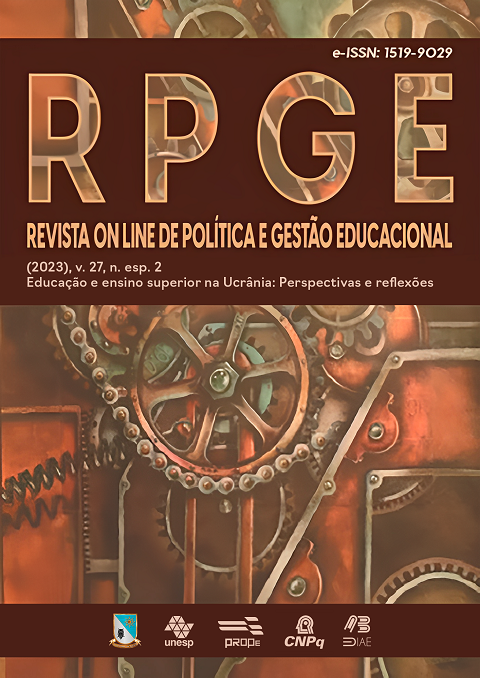On the issue of improving the level of communicative competence of higher education students in foreign language classes
DOI:
https://doi.org/10.22633/rpge.v27iesp.2.18384Keywords:
Online platforms, Communicative competence, Distance learning, Foreign languagesAbstract
The aim of the article is to analyze the methods of increasing the level of communicative competence of higher education applicants in foreign language classes. The research is based on the systematic method, comparative analysis, and abstraction, application of the dialectical method, forecasting. The results investigate the problem of communicative competence in modern teaching conditions (analysis of general principles and remarks). Separate attention is also paid to the issues of modern methods of increasing the level of communicative competence of higher education applicants in foreign language classes. The conclusions noted the effectiveness of online platforms (Futureleam, Puzzle-English, Skyeng, Duolingo, Lingualeo and others) and the importance of thorough work in foreign language classes.
Downloads
References
ABD-RABO, A.; HASHAIKEH, S. The digital transformation revolution. International Journal of Humanities and Educational Research, v. 3, n. 4, p. 124-128, 2021. DOI: 10.47832/2757-5403.4-3.11.
AHNAGARI, S.; ZAMANIAN, J. Intercultural Communicative Competence in Foreign Language Classroom. International Journal of Academic Research in Business and Social Sciences, v. 4, n. 11, 2014. DOI: 10.6007/ijarbss/v4-i11/1265.
ARAUJO PORTUGAL, J. Intercultural communicative competence in foreign language learning. Global Journal of Foreign Language Teaching, v. 11, n. 4, p. 243-256, 2021. DOI: 10.18844/gjflt.v11i4.6006.
BAHLAI, O. et al. Developing students’ intercultural communicative competence in foreign language classroom. Advanced Education, v. 6, n. 11, p. 55-59, 2019. DOI: 10.20535/2410-8286.158078.
EZHIL MARY, S.; NIRMALA, J. R. Communicative Language Teaching Enhances Communicative Competence. In: ANNUAL INTERNATIONAL CONFERENCE ON LANGUAGE, LITERATURE & LINGUISTICS, 1., 2012, Singapore. Proceedings […]. [S. l.]: Global Science & Technology Forum (GSTF), 2012. DOI: 10.5176/2251-3566_l312166.
HAIDABRUS, B. Information technology and management in higher education and science. Futurity Education, v. 2, n. 4, p. 26–35, 2022. DOI: 10.57125/FED.2022.25.12.03.
HALIAN, I. et al. Communicative Competence in Training Future Language and Literature Teachers. Revista Amazonia Investiga, v. 9, n. 29, p. 530-541, 2020. DOI: 10.34069/ai/2020.29.05.58.
HORDIICHUK, O. et al. Analysis of models of inclusive education in European countries (experience for Ukraine). Eduweb, v. 16, n. 4, p. 32-41, 2022. DOI: 10.46502/issn.1856-7576/2022.16.04.3.
JÄRVIS, M.; TAMBOVCEVA, T.; VIROVERE, A. Scientific innovations and advanced technologies in higher education. Futurity Education, v. 1, n. 1, p. 13–22, 2021. DOI: 10.57125/FED.2022.10.11.2.
KHARITONENKO, L. Analysis of innovative methods of Ukrainian language teaching at the educational institutions of general secondary education. Futurity Education, v. 2, n. 2, p. 52–64, 2022. DOI: 10.57125/FED.2022.25.06.6.
KOSTYRYA, I. et al. Intercultural Communication Skills as an International Tool for the Development of English-Language Communicative Competencies. Journal of Curriculum and Teaching, v. 11, n. 6, p. 30, 2022. DOI: 10.5430/jct.v11n6p30.
MARTINEZ-NUÑEZ, M.; BORRAS-GENE, O.; FIDALGO-BLANCO, Á. Virtual Learning Communities in Google Plus, Implications, and Sustainability in MOOCs. Journal of Information Technology Research, v. 9, n. 3, p. 18-36, 2016. DOI: 10.4018/jitr.2016070102.
NAMAZIANDOST, E. et al. Implementing a flipped model of instruction in the EFL listening classroom: Impact on comprehension. Journal on English as a Foreign Language, v. 10, n. 2, p. 385-401, 2020. DOI: 10.23971/jefl.v10i2.2065.
NARKE, P. Communicative Strategies as a Tool for Assessing Spoken Interactional Competence. In: NARKE, P. Task-Based Language Teaching and Assessment. Singapore: Springer Singapore, 2021. p. 249-274. ISBN 9789811642258. DOI: 10.1007/978-981-16-4226-5_13.
PODGÓRECKI, J.; ROPSKI, J. Communicative competence. Historical and social-educational ideas, v. 7, n. 6/1, p. 173-178, 2015. DOI: 10.17748/2075-9908-2015-7-6/1-173-178.
VASYLYSHYNA, N. The foreign-language communicative competence grounds of master course students. Scientific bulletin of South Ukrainian National Pedagogical University named after K. D. Ushynsky, v. 1, n. 130, p. 114-119, 2020. DOI: 10.24195/2617-6688-2020-1-15.
Published
How to Cite
Issue
Section
License
Copyright (c) 2023 Revista on line de Política e Gestão Educacional

This work is licensed under a Creative Commons Attribution-NonCommercial-ShareAlike 4.0 International License.
Manuscritos aceitos e publicados são de propriedade da Revista on line de Política e Gestão Educacional. É vedada a submissão integral ou parcial do manuscrito a qualquer outro periódico. A responsabilidade do conteúdo dos artigos é exclusiva dos autores. É vedada a tradução para outro idioma sem a autorização escrita do Editor ouvida a Comissão Editorial Científica.











